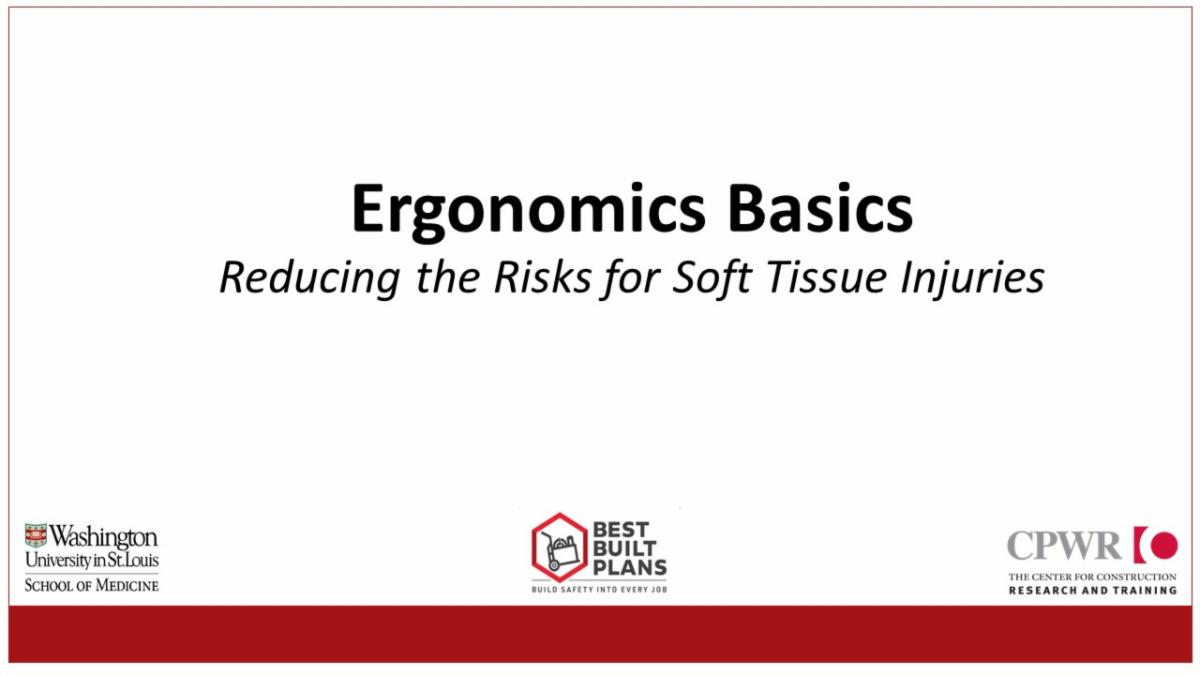|
CPWR UPDATE
|
March 2020
| |
From the Desk of Chris Trahan Cain, Executive Director
|
|
|
|
New Best Built Plans Ergonomics Training Program for Construction Workers
 CPWR is pleased to announce the release of a new ergonomics training program for construction workers, the first part of a two-part comprehensive training program focused on preventing back, shoulder, and other types of soft tissue injuries. These injuries, also referred to as musculoskeletal disorders (MSDs), account for more than 25% of nonfatal injuries in the industry. This worker-focused ergonomics training program provides instructors with information to raise workers' awareness of soft tissue injuries and ways to prevent them, including safe lifting practices and proper body mechanics. It includes both classroom and hands-on components, sections to use with new and more experienced workers, and an Instructor Guide. The program is designed to allow an instructor to tailor it to the time and resources available and the needs of their trainees.
The second part of the program, to be released soon, is designed for employers. Both the worker and contractor programs build on the materials in the Best Built Plans program and make the important connection between how preventing injuries and pain can also reduce the need for pain medication and risk of developing an opioid use disorder.
The need for a comprehensive training program that addresses the needs of workers and their employers was first raised by the United Association of Journeymen and Apprentices of the Plumbing and Pipe Fitting Industry (UA) and the Mechanical Contractors Association of America (MCAA), both of whom contributed to the content and tested the training materials with their members. The program was developed in collaboration with researchers from Washington University in St. Louis.
|
|
TOOLS FOR SAFETY AND HEALTH
Resources to Learn More about the Coronavirus
7th Annual National Safety Stand-Down to Prevent FallsPart of the National Campaign to Prevent Falls in Construction, the seventh annual National Safety Stand-Down will take place May 4-8, 2020. The Stand-Down is an opportunity for employers to pause work and have a conversation with workers about fall hazards, protective methods, and the company's safety policies, goals and expectations; it also enables workers to talk to management about fall hazards they see. CPWR's One-Stop Stand-Down Shop includes everything you need to hold a Stand-Down -- Toolbox Talks, videos, worker handouts, job site posters, and more. New materials from all three lead organizers -- OSHA, NIOSH, and CPWR -- will be added over the next two months, but our FREE 2020 hardhat stickers are already available. Order them, along with pocket-sized Hazard Alert Cards, on the Stop Construction Falls website.
Video: Safe Ladder Practices & the NIOSH Ladder App
Our Roofing r2p Partnership (National Roofing Contractors Association and the United Union of Roofers, Waterproofers and Allied Workers) developed a short video that walks you through safe ladder practices and how to use the National Institute for Occupational Safety and Health's free ladder safety app. While developed with the roofing industry in mind, this video's lessons and tips can benefit anyone who uses a ladder.
|
RESEARCH NEWS
New Primer on Using Social Network Analysis
Construction Safety & Health Research: A Social Network Analysis Primer helps safety and health researchers decide if social network analysis (SNA) is right for their research project and introduces key steps for conducting their own SNA. Throughout this new primer, information from the Falls Campaign SNA grounds the content through a real-life example.
Exposures and urinary biomonitoring of aliphatic isocyanates in construction metal structure coating. Anila Bello, Yalong Xue, Rebecca Gore, Susan Woskie, and Dhimiter Bello. International Journal of Hygiene and Environmental Health, 2020. Read the article.
Prevention through Design (PtD) to Make Solar-Ready Houses Safe for Solar Workers. Hyun Woo Lee, John Gambatese, and Yohan Min. CPWR Small Study, 2020. Read the Key Finding.
|
TODAY at 2:00 p.m. E.T.: Fall Protection Q&A Panel (1 hour+)
Falls remain a leading cause of on-the-job injuries and fatalities, and the ANSI/ASSP Z359 Fall Protection Code provides an overall blueprint to help prevent injuries and illnesses for workers at height. Share your questions with members of the Z359 Committee and learn how to apply the code to your fall protection efforts.
Thursday, March 26 at 2:00 p.m. E.T.: Tools for Defending Against the Top Four Killers of Construction Workers
There are several hazards that put construction workers in danger daily. In this webinar hosted by Occupational Health & Safety, CPWR staff will discuss "The Focus Four," or the four hazards, according to OSHA, that cause the most fatalities among construction workers: falls, electrocutions, struck-by, and caught-in/between.
The program will start with an overview by Bruce Lippy, Director of Nanomaterials Research, of the scope of these four hazards. CPWR has been a major participant with OSHA and NIOSH in the Stop Construction Falls campaign for years and is offering new materials for the 2020 National Falls Stand-Down. Additionally, CPWR is working with the NIOSH NORA Struck-By Work Group, a coalition of stakeholders, to prevent struck-by work zone fatalities. Eileen Betit, Director of Research to Practice, will present the materials developed as part of this program and will also describe the first annual National Stand-Down to Prevent Struck-By Incidents, taking place April 20. Chris Le, Program Manager for Construction Solutions, will follow with a discussion of innovative technologies maintained in the CPWR Construction Solutions database with select examples for preventing Focus Four injuries and deaths.
Register Here
|
|
CPWR Staff Presentations
Paper: "Is Construction Hazardous? Science, Sources, and Strategies"
- Linda Goldenhar, Director, Evaluation and Research
Upcoming Meetings3/11/20, Tempe, Arizona -- Prevention through Design Workshop 2020Part of Arizona State University's five-year Prevention-through-Design (PtD) Initiative, this one-day workshop will enable participants to exchange and leverage their experiences and expertise on PtD research, practice, and education efforts. Participants will receive Continuing Education Units at the end of the workshop. Registration (which involves a nominal fee) is open now.
|
|
|
|
|